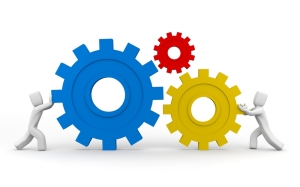
If a business simulation has been customised, this means that it has been modified in accordance with the customer’s individual requirements. A customised simulation gives delegates the chance to take part in training which is industry specific as well as company specific, creating a unique and relatable experience. There are many benefits of customising a business simulation which makes them more appealing than non-customised simulations, these include:
1. Increases relevance of simulation This is one of the biggest benefits of customisation, as when a simulation has been customised for an organisation it becomes a lot more realistic and relevant for the delegates taking part and makes it feel less like a game. For example if a company’s own products are used, which the delegates are familiar with, then it will make the simulation feel more realistic and interesting.
2. The rules in the simulation will mirror what would actually happen The simulation will mirror what would actually happen if the delegates make these decisions within their company. Delegates are therefore able to understand the concepts being presented better and can link the material back to their own workplace. This makes the simulation feel like a more worthwhile experience than using an off-the shelf model.
3. Unique experience Companies also have a unique simulation tailored for their own employees which can be a real asset, as it can be used over and over again and can be tweaked at anytime! If a simulation is customised using the company’s logo, financial data, KPI targets as well as being written using their own terminology, it can make the delegates feel like they are taking part in something truly unique to their company.
4. More engaging toolkits Simulations may include different projects and market updates which delegates can choose to respond to. If these are specific to a company e.g. A supermarket has been fined for selling out of date food, it means that the supermarket managers playing the simulation are more likely to remember the impact this had and how they responded to it, than if the update was related to say the motor industry. Customisation also makes the documentation being handed out to teams look better.
It is important to remember that customised simulations will take longer to design than off-the shelf simulations as real company data and information is required. Customised simulations therefore often require the support of a subject matter expert from the industry to ensure it is as realistic as possible.
To find out more about the role of an SME in a business simulation check out my blog: Why is a subject matter expert vital for a business simulation to succeed?
I still however think that if you have a customised simulation it is always going to be received better and will be more engaging for delegates, therefore customisation is definitely the key to creating a successful business simulation!